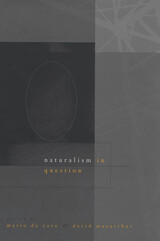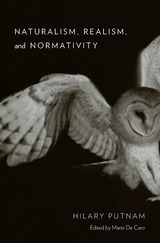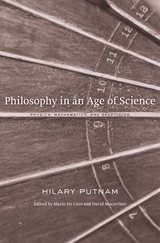

Today the majority of philosophers in the English-speaking world adhere to the "naturalist" credos that philosophy is continuous with science, and that the natural sciences provide a complete account of all that exists--whether human or nonhuman. The new faith says science, not man, is the measure of all things. However, there is a growing skepticism about the adequacy of this complacent orthodoxy. This volume presents a group of leading thinkers who criticize scientific naturalism not in the name of some form of supernaturalism, but in order to defend a more inclusive or liberal naturalism.
The many prominent Anglo-American philosophers appearing in this book--Akeel Bilgrami, Stanley Cavell, Donald Davidson, John Dupré, Jennifer Hornsby, Erin Kelly, John McDowell, Huw Price, Hilary Putnam, Carol Rovane, Barry Stroud, and Stephen White--do not march in lockstep, yet their contributions demonstrate mutual affinities and various unifying themes. Instead of attempting to force human nature into a restricted scientific image of the world, these papers represent an attempt to place human nature at the center of renewed--but still scientifically respectful--conceptions of philosophy and nature.

Hilary Putnam’s ever-evolving philosophical oeuvre has been called “the history of recent philosophy in outline”—an intellectual achievement, nearly seventy years in the making, that has shaped disciplinary fields from epistemology to ethics, metaphysics to the philosophy of physics, the philosophy of mathematics to the philosophy of mind. Naturalism, Realism, and Normativity offers new avenues into the thought of one of the most influential minds in contemporary analytic philosophy.
The essays collected here cover a range of interconnected topics including naturalism, commonsense and scientific realism, ethics, perception, language and linguistics, and skepticism. Aptly illustrating Putnam’s willingness to revisit and revise past arguments, they contain important new insights and freshly illuminate formulations that will be familiar to students of his work: his rejection of the idea that an absolute conception of the world is obtainable; his criticism of a nihilistic view of ethics that claims to be scientifically based; his pathbreaking distinction between sensations and apperceptions; and his use of externalist semantics to invalidate certain forms of skepticism. Above all, Naturalism, Realism, and Normativity reflects Putnam’s thinking on how to articulate a theory of naturalism which acknowledges that normative phenomena form an ineluctable part of human experience, thereby reconciling scientific and humanistic views of the world that have long appeared incompatible.

Hilary Putnam’s unceasing self-criticism has led to the frequent changes of mind he is famous for, but his thinking is also marked by considerable continuity. A simultaneous interest in science and ethics—unusual in the current climate of contention—has long characterized his thought. In Philosophy in an Age of Science, Putnam collects his papers for publication—his first volume in almost two decades.
Mario De Caro and David Macarthur’s introduction identifies central themes to help the reader negotiate between Putnam past and Putnam present: his critique of logical positivism; his enduring aspiration to be realist about rational normativity; his anti-essentialism about a range of central philosophical notions; his reconciliation of the scientific worldview and the humanistic tradition; and his movement from reductive scientific naturalism to liberal naturalism. Putnam returns here to some of his first enthusiasms in philosophy, such as logic, mathematics, and quantum mechanics. The reader is given a glimpse, too, of ideas currently in development on the subject of perception.
Putnam’s work, contributing to a broad range of philosophical inquiry, has been said to represent a “history of recent philosophy in outline.” Here it also delineates a possible future.
READERS
Browse our collection.
PUBLISHERS
See BiblioVault's publisher services.
STUDENT SERVICES
Files for college accessibility offices.
UChicago Accessibility Resources
home | accessibility | search | about | contact us
BiblioVault ® 2001 - 2024
The University of Chicago Press









